| |
|
|

|
|
ATLAS |
|
|
Assistive
Technology
Laboratory
at
Stanford |
|
|
|
Technology
and design benefitting individuals with disabilities and older adults in the
local community |
January 30, 2016 |
|
|
|
|

Perspectives is the newsletter of the
Stanford course,
Perspectives in Assistive
Technology.
This issue invites you
to attend the course's Assistive Technology
Faire.
Perspectives in Assistive Technology is a Winter
Quarter Stanford course - now in its tenth year - that explores the design,
development, and use of assistive technology that benefits people with
disabilities and older adults. The schedule
consists of semi-weekly classroom discussions; lectures by
notable professionals, clinicians, and assistive technology users; tours
of local medical, clinical, and engineering facilities; an assistive
technology faire; and a film screening.
Next class
session - Thursday, February 4th at 4:30pm (new starting time):
|
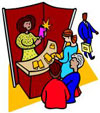
|
Assistive Technology
Faire
|
|
Abstract: This event will provide an opportunity
for students and community members to get an up-close look at a variety of
devices and learn about available programs from product vendors and service
agencies. Users of assistive technology products as well as small companies and
agencies serving individuals with disabilities and older adults are encouraged
to bring assistive technology devices to display, demonstrate, and
discuss.
The Faire starts at 4:30pm on Thursday, February 4th just outside
the classroom, Thornton
110.
Here are photos
from last year's event. |
|
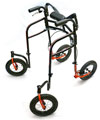
|
Life Glider™
Life Glider™ - Rob
Karlovich
The Life Glider™ is an innovative
walking aide with a unique hands-free support feature for people with balance
and weight-bearing challenges. It enables users to stand and walk safely and
comfortably for extended periods while engaged in everyday activities such
cooking and grocery shopping. |
|

|
Service Dog Training
Service Dog Tutor - Jean Cary and
Service Dog Ranger
Service Dog
Tutor adapts clients' own dogs to do specific service tasks for their
owners. Clients include seniors and children who have mobility and balance
challenges as well as cognitive disabilities. |
|
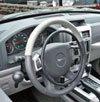
|
Digital Accelerator Ring and the
Main Hand Brake
Kempf -
Martine Kempf
The Digital
Accelerator Ring and the Main Hand Brake are hand controls that can be
installed on most cars with automatic transmissions to allow a person who has
lost the use of both legs to drive with both hands on the steering
wheel. |
|
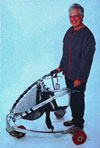
|
Podna Rover
Podna Designs - Elaine Levin
The Podna Rover
is an innovative all-terrain mobility device for individuals who need
additional support to maintain balance or stability while walking. The device
offers confidence to outdoor travelers over gravel, uneven surfaces, and
inclines. It features compliant wheels, a self-centering frame, a suspension to
soak up bumps, and self-locking brakes. |
|

|
Whill Wheelchair
Whill, Inc. - Chris Koyama
The Whill is an
omnidirectional four-wheel-drive mobility device meant to give wheelchair users
a sleek alternative to standard chairs, which many believe reinforce
stereotypes of weakness or helplessness. The product recently received the
Good Design Grand
Award. |
|

|
Eyefluence’s Eye-interaction
Platform
Eyefluence - Peter Milford
Eyefluence’s
eye-interaction platform provides technology that can be integrated
into any head mounted device to realize the potential for wearable computing by
connecting your brain to the internet through your eyes. Head-mounted displays
equipped with Eyefluence's eye-interaction technology have the potential to
expand human intelligence, enhance social interaction, and revolutionize
entertainment. |
|
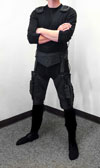
|
Beyond Exoskeletons - SRI's
Wearable Exosuit Technologies
SRI International - Roy Kornbluh
SRI is developing
wearable "exosuits" that can augment the musculoskeletal system for performance
and strength enhancement and assistance to overcome or prevent damage from
injury or disease. SRI's exosuit differs from exoskeletons by using new
muscle-like actuation, comfortable and soft skin attachment, and electronically
releasable spring elements to minimize mass, bulk, and noise. As part of
DARPA's
Warrior
Web program, the technology is being applied to prevent and reduce
musculoskeletal injuries caused by dynamic events typically found in the
warfighter’s environment. We are exploring other military applications and
beginning to use the technologies to assist individuals with musculoskeletal
disease. |
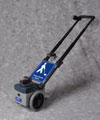  |
Robotic Guide & Ultrasonic
White Cane
Intellisight
- Brian Higgins
The Robot Guide
is a 7th generation prototype that employs three ultrasonic sensors and a LIDAR
range sensor while the Ultrasonic White Cane incorporates one ultrasonic
sensor. Both devices use a Bluetooth bone conduction headset to provide audio
feedback about objects in the walking path, enhancing guidance and navigation
for blind travelers. |
|
Attend a lecture -
Course lectures will be held on Tuesdays
and Thursdays from 4:30 to 5:50pm and are open
to the greater Stanford community. You are most welcome to sit in on class
sessions that interest you. You need not be a Stanford student and there is no
required signup, enrollment, or charge. The class will meet in a large, tiered,
accessible classroom on campus in the Thornton Center, adjacent to the Terman
Fountain and near the Roble Gym, the same venue as last year. Here are the
parking options, maps, and directions to
the classroom. |
 |
|
|
Did you miss a
lecture? - Course lectures are posted on YouTube. To find the links,
browse to the Lecture Schedule webpage,
scroll down and click on the lecture of interest. Near the bottom of the page
you will see the Lecture Material section which has links to the slides,
photos, weblinks, and lecture video. |
 |
|
Would you like to support the
course? - Funding in any amount for the course and student projects
is always welcomed. Monetary gifts support approved project expenses,
administrative costs, honoraria for guest lecturers, and the end-of-term
celebration. Refer to the Team Project Support
webpage for more information.
Do you have a question,
comment, or suggestion? - If you have general questions, comments,
or suggestions about the course, David L. Jaffe, MS, the instructor, can
be reached by email or at
650/892-4464. Thank you again for your interest in the course.
Dave
|

To unsubscribe from this newsletter, please email
Dave. |
|















